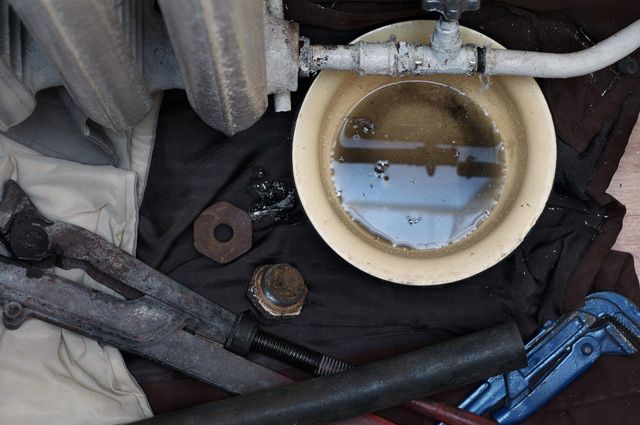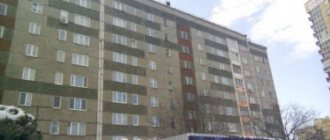What to do first?
If the heating battery bursts, then the first thing to do is turn off the water and try to remove the water that has already poured into the room . You will need to figure out what happened and where to call later.
Step-by-step action plan:
- Place any large container under the stream of boiling water. It is better to use a plastic one, since if you use a metal one, it will simply heat up to 80-95% degrees, which will make it impossible to carry the container normally (to drain the collected water). We recommend using a plastic basin or bathtub for children.
- After installing the container, be sure to leave someone on duty so that he can constantly remove the drained water. Ideally, use two containers, using them alternately (while we are draining from one, we are filling the other).
- While everyone is busy collecting and draining boiling water, someone must run to the basement and turn off the central valve of the heating system. This needs to be done as quickly as possible, before you flood your neighbors in the riser.
- After shutting off the central valve, you need to call an emergency team of plumbers or utility workers.
The consequence of a breakthrough could be flooding of neighbors and if the fault lies with you, the court will recover a huge amount of money
Things are different if there is no one to help you. Then, after placing the container under the stream of hot water from the burst battery, you need to immediately call the emergency service. Then ask your neighbors to turn off the valve in their basement.
Where to call?
If you find even small leaks from the pipes of the heating system or radiator, contact your service company immediately.
You cannot eliminate a radiator leak on your own - to do this you need to turn it off and drain the entire riser. If the Mayevsky crane malfunctions, do not do anything on your own - you need to contact a service company.
What to do if there is a breakthrough in an individual heating system? (+video)
The action plan in case of a battery breakthrough in an individual heating system is as follows:
- do not try to collect water in plastic containers or close the central valve - you need to turn off the circulation pump so that the water does not continue to flow under pressure;
- place a container under the break to collect the remaining water;
- be sure to turn off the valve to the boiler and close the central valve connected to the supply or discharge pipe;
- throw rags on the floor to catch any spilled water.
If the heating pipe is leaking
If a heating pipe bursts in an apartment, use all available absorbent means: rags, sponges. Be careful, the temperature of the liquid is high enough to cause burns. A rag wrapped around the pipe will help reduce the water pressure. It is urgent to call the emergency service of the Vodokanal branch.
The arriving specialists will shut down the heating system in the house. Before they arrive, take measures to avoid flooding your neighbors or at least minimize the consequences of a leak. Open the windows to lower the coolant temperature.
Who pays for damage if a vertical water pipe breaks?
The situation when a leaking riser causes a flood in an apartment is very unpleasant. But it’s even more difficult if the apartments located below were damaged due to the accident. Neighbors have the right to demand compensation for damage, and it often amounts to a considerable amount. However, the owners of the apartment are not always to blame for the accident. The Housing Code clearly defines who is responsible for an accident. If the section of pipe up to the shut-off device fails, the HOA or the management company are considered to be the culprits. In other cases, the owners of the apartment bear responsibility for the damage caused. They are also required to monitor the health of the system and promptly report problems.
Be sure to read it! How to find out your work experience - check via the Internet, using SNILS and other methods
In a non-privatized, municipal apartment
Government decree number 491, which defines the rules for maintaining common property, states that maintenance and repair of the water supply system is carried out at the expense of residents. As for the replacement of pipes, it is carried out during the renovation of the entire building. Funds for this are allocated from voluntary contributions made by residents. This is also stated in Article 67 of the RF Housing Code.
Responsibility for the proper operation of the water supply and sewerage lies with the HOA. Utility workers are required to regularly check equipment and, if necessary, repair or replace it. However, it must be taken into account that if a leak occurs on the territory of the apartment, its residents will have to pay for the damage, even if they are not the owners.
If your upstairs neighbors flooded you and there are facts confirming their negligence, you should demand compensation for damage from them.
In a privatized apartment
Homeowners, as well as citizens living under a social tenancy agreement, are required to pay utility bills. The technical serviceability of the sewerage, water supply and heating systems is monitored either by special organizations with which the HOA has entered into a contract, or by the management company. Planned replacement of equipment is carried out during major repairs, at the expense of paid contributions. If the apartment owner wishes to replace the pipes ahead of schedule, this will have to be done at his own expense.
Both in the case of municipal housing and in privatized apartments, employees of housing maintenance offices are required to regularly check equipment. Residents are notified of such events in advance. After the inspection, the owner or tenant signs the inspection report. Residents who interfere with the inspection of technical systems are found guilty if a riser burst or a pipe burst in their apartment .
If a common riser fails, residents need to record this fact, draw up an individual (or collective) statement, accompanying it with photos or video materials. The latter is not necessary, but desirable. The application is handed over to the employees of the housing office, keeping a copy for yourself. It may be useful when going to court.
When does tenant liability arise?
Persons renting residential premises are responsible for maintaining the property located in the apartment in proper condition.
When it is proven that the tenant deliberately damaged property, including the communication system located in the apartment, the owner will have the right to apply to him for compensation for the damage caused.
In this regard, you should not panic when a pipe bursts in your apartment. First, you should inform the authorized authorities and record the accident. Next, you need to determine the cause of the breakthrough
Where to go if the apartment is owned by a housing cooperative
Housing cooperative is a group of private owners who are owners of property on the basis of equity participation. To put it simply, residents of cooperative houses, as well as residents of municipal high-rise buildings, have to pay for the maintenance and repair of the local area and common property.
Until the full payment of the cost of the cooperative apartment, its owner is the housing cooperative. After repayment of all contributions, the living space becomes the property of the shareholder. The organization of maintenance of such residential properties is no different from municipal buildings. Maintenance is carried out by the association of owners of cooperative housing (HOA) through an agreement with the Management Company, or independently. In some cooperatives, management is carried out by housing cooperatives. But most often they do not carry out any work on their own, but only enter into an agreement with the management company.
Hired specialists are required to carry out routine and scheduled repairs of equipment in cooperative houses. But the residents of the cooperative building will have to pay for it out of their own pockets.
As Art. 110 clause 2 of the Housing Code of the Russian Federation, owners of cooperative housing participate in the maintenance of the house. If a pipe burst occurs on the territory of an apartment, its owner is recognized as the culprit.
If you can't reach an agreement
Remember, when a person believes he is not at fault for an accident that occurred at home, he should not sign agreements or transfer funds to neighbors.
When a peaceful solution to the problem does not occur, the parties have the right to go to court. On the one hand, such a procedure will take a long period of time. On the other hand, going to court will help resolve the controversial situation in accordance with the norms of current civil law.
Before going to court, you must contact an expert who will conduct an independent examination of the damaged property. When a person does not agree with the results of the examination, it can be challenged.
When an interested person files a claim in court, the defendant has the right to insist on replacing the defendant, citing the management company’s failure to fulfill obligations related to maintaining the house.
When flooding occurred due to the fault of the owner of the residential premises, it is better to compensate for the damage voluntarily. When paying out funds, it is recommended to transfer money only on the basis of a receipt for receipt of funds, indicating the amount and reason for the transfer of funds.
Such a document may be required in the future if the victim abuses the right to receive compensation.
The parties have the right to draw up an agreement that specifies the following list of information:
- information about the parties (full name, passport details, information about the place of registration or contact information);
- information about the details to which funds are transferred if the payment is made in cashless form;
- the reason for which the funds are transferred (damage caused as a result of a pipe break);
- information about the date and time of the accident;
- the amount of damage that is subject to compensation by a person.
What causes breakouts most often?
There are not as many reasons for a broken pipe as you might think. But it is necessary to understand the exact cause, at a minimum, in order to find the culprit and prevent a recurrence of the accident.
Possible reasons:
- Unsatisfactory condition of communications (old pipes, radiators, fittings).
- Damage to fittings.
- Incorrectly performed repairs to fittings or pipes.
- Water hammer due to a sudden increase in pressure.
Consider the time of year in which the breakthrough occurred. During the heating season, commission inspections and examinations are used to find the cause. Outside the heating season, there is only one reason - a breakthrough occurs due to hydraulic tests (usually either the management company or the heating point is to blame).
Breakdown of the heating system during the heating season
An emergency situation that arose during the winter period belongs to a special category of incidents. When heating pipes break, at this moment the fear is not even that water will begin to flood the room. There is a high risk of getting burns from hot water.
Attempts by residents to fix such breakdowns on their own are extremely undesirable. It is recommended, if possible, to ensure the safety of people and the safety of valuable property, including documents.
In the summer months, the management company is obliged to carry out scheduled pressure testing of heating equipment, which consists of running cold water through the pipes. In such cases, as a rule, damaged pipes make themselves known through leaks.
Residents are notified of the inspection at least 3 days in advance so that they can adjust their plans and be present at home at the time of the event.
An owner who notices leaking pipes in his or a neighboring home contacts repairmen, and the repairs are carried out at the expense of the management company.
How to record an accident?
If there is a heating failure in your apartment, the management company may try to hold you accountable. After all, she will have to pay the bills of all the affected persons, and these may be residents of several floors. Naturally, the company will not want to compensate for such damage.
Therefore, you need to prepare a refutation. It is recommended to record a video or at least take a photo of the accident scene. You need to start taking photos and videos as early as possible, and filming all the details: the location of the break, the consequences (amount of water, damaged furniture and decoration) for you and your neighbors.
Without fail, representatives of the HOA will issue a report on the accident that occurred. It also needs to be saved and be sure to check that the information in it is recorded correctly.
As judicial practice shows, the more small evidence there is, the more likely it is that the court (if it comes to it) will take your side.
The riser burst: who is to blame?
You are mistaken in thinking that everything outside the door of your apartment is exclusively your property. According to clause 5 of the Rules for the maintenance of common property in the MKD, approved. By Government Decree No. 491 of August 13, 2006 (hereinafter referred to as the Rules), in-house engineering systems for cold and hot water supply, consisting of:
- risers;
- branches from the risers to the first disconnecting device located on the branches from the risers;
- disconnecting devices;
- collective (common house) cold and hot water meters;
- the first shut-off and control valves on the branches of the intra-apartment wiring from the risers;
- mechanical, electrical, sanitary and other equipment located on these networks
are the common property of the residents of the high-rise building . Therefore, when a riser in an apartment bursts, it does not matter at all in which apartment this breakthrough occurred - along its entire length it is common to all residents.
But it’s hard to blame them for the breakthrough either. Proper maintenance of engineering systems, according to clause 16 of the Rules, depends on the method of managing common property and is ensured by the owners by concluding a management agreement with the management organization. And in accordance with clause 42 of the Rules, it is precisely such organizations that are responsible for the maintenance of common property to residents.
From all this we conclude that the riser in your apartment is common, and the management company (HOA, housing cooperative or other organization that manages the common property of the apartment building) is responsible for its maintenance. And the fact that it is in your apartment does not mean that it is used exclusively by you (Clause 13 of the Review of Judicial Practice of the Supreme Court of the Russian Federation No. 4, approved by the PVS of the Russian Federation on December 20, 2016).
How to blame the Criminal Code?
But not everything is so simple. In order to “let all the dogs go” on the management company, you need to find out (Definition of the RF Armed Forces No. 58-KG16-2 dated January 10, 2017):
- whether the section of the engineering system where the pipe burst and flooded the apartment belongs to common property. That is, it really must be a riser or its branches;
- whether the management company is responsible for its maintenance - an agreement must be concluded;
- reasons for the breakthrough - natural wear and tear of parts, pipe destruction, corrosion and other reasons arising due to improper maintenance;
- whether the management company took steps to properly maintain and operate the broken pipe, whether regular, seasonal inspections, pressure testing and other mandatory measures were carried out, whether the management company responded to residents’ statements about leaks, and so on.
Obviously, there will be violations in the work of the Criminal Code - this is in their tradition. And then they will be obliged to compensate their neighbors for the damage. The main thing is that there is no interference on your part in the operation of engineering systems, otherwise you will be made to blame. Independent replacement of the riser, local repair of leaks without the knowledge of the management company, unauthorized tapping, all this is grounds for recovering damages from the owner of the apartment where the leak was discovered. Example - Decision of the Zavodsky District Court of Novokuznetsk in case No. 2-88/2014 dated September 26, 2014.
Who is to blame for the accident?
After the accident is localized, a debriefing begins and the search for those to blame begins. The management company will not always be responsible for the accident: the owner of the apartment may be to blame.

There is no need to try to fix something yourself; your task is to collect water in a container, preventing it from getting on the floor, and wait for specialists
If you did not replace the heating pipes or batteries yourself, the blame falls on the HOA.
If you did something with the heating system yourself without the participation of the HOA (for example: changing a battery or faucet), and a breakthrough occurred at the place of work, then you will most likely be blamed.
Surprisingly, but true: if you did something with the heating system without the participation of the HOA, but the accident occurred for completely different reasons (not your fault), you may still be at fault.
What to do if a riser breaks in a privatized apartment?
Apartments that are privately owned and current major repairs are also paid for in the form of security for common property. Communications belonging to common property must be repaired by organizations with which an agreement has been concluded with the HOA or management company.
Risers located on the territory of a privatized apartment are also classified as common property. However, the rush that occurs after the cut-off device is due to the fault of the homeowners.
Important! The responsibilities of the utility service include regular inspection of the technical condition and serviceability of all pipes on the territory of an apartment building. In cases where the owner does not want to allow housing office workers to inspect the riser and water supply in the apartment, the consequences and damage after the accident fall on the owner of the property.
Are the CCs right?
Let's look at this in more detail. In its decision dated September 22, 2009 No. GKPI 09-725, the Supreme Court explained the following on this issue.
If the heating radiator located in the apartment has shut-off devices, that is, the owner can easily dismantle it after receiving permission for reconstruction without causing harm to the entire heating system, then the radiator belongs to personal property and not to common property. Consequently, it is the owner of the apartment, and not the management company, who is responsible for monitoring its serviceability.
If the heating radiator does not have shut-off devices, then it belongs to common property, and the burden of maintenance will be borne by both the owner and the management company.
Liability for an accident in public housing
The apartment may be owned by other private individuals, institutions or entities, including municipal ones, who rent it out. The municipality is an equal owner, like any other entity, and has the same responsibilities for maintaining the apartment.
Tenants also bear some responsibility for pipes and their timely repair. However, their reinstallation is classified as a major overhaul, and it is implemented at the expense of the owner of the housing property.
In other words, when a riser pipe bursts in a municipally owned apartment, government officials, notified by the tenant, must contact the management company and order repairs.
We remind you that even if you thoroughly study all the data that is in the public domain, this will not replace the experience of professional lawyers! To get a detailed free consultation and resolve your issue as reliably as possible, you can contact specialists through the online form .
Who is guilty?
Finding out whose fault the accident occurred is a key stage of the proceedings, following which it is determined who will compensate for the material damage caused.
The battery burst and flooded the neighbors
In such situations, the owner of the property or the management company that monitors the condition of the heating pipes of the entire house may be found guilty.
Art. 30 of the Housing Code of the Russian Federation obliges owners of residential premises to fulfill obligations to maintain property in proper condition, monitor the pipes in the apartment and the heating system as a whole. If necessary, they must take measures to repair them.
If the batteries are in poor condition, then the owner of the living space is obliged to contact the housing office and call a technician. The invitation of a specialist is documented by writing an application. Upon completion of the work, the customer is issued an acceptance certificate. If these requirements are met, responsibility for a battery breakthrough falls entirely on the management company.
At his own expense, the owner of the living space carries out repairs of those devices that have ceased to function due to his fault. For example, a plumbing breakdown. Equipment repairs are also carried out by a specialist and only with the permission of the Housing Office. If the owner carries out restoration or replacement on his own, then in the event of flooding of the neighbors below, the responsibility falls on him.
Representatives of the management company must conduct scheduled inspections of equipment at least 2 times during the calendar year. After completing the inspection, the owner receives a corresponding report with the results. If the owners of the living space do not allow specialists into the premises, then this fact is equated to improper use of engineering systems. If an accident occurs, the owners bear full responsibility.
The riser burst
Water supply and sewerage networks are the common property of an apartment building (RF RF No. 491 of 2006). Apartment owners pay a monthly fee to the management company for the maintenance of the house, so their employees are required to monitor the condition of the heating, including the risers. In the event of a breakthrough, responsibility falls on the service organization. Residents record the fact of an accident by drawing up a report with representatives of the management company, assess the damage with the help of an independent expert, prepare a written claim and send it to the office of the service organization.
Nuances in case of an accident during the heating season and during the warm season
If pipes break in the winter, all the resident needs to do is call repairmen and try to protect the property from flooding. The following is the standard trial procedure. In the summer, management company employees are required to carry out routine inspections of the heating systems of multi-storey buildings. Residents of the building are notified of the event three days before the start of work. The test is carried out by running cold water under pressure through the pipes. Worn out or incorrectly connected batteries will leak, so CC employees recommend that citizens stay at home while working. If one of the residents notices that is leaking , they should immediately inform the repairmen about this so that the break can be repaired.
Heating season or not: subtleties of the issue
Separately, it should be noted that the apartment was flooded due to burst pipes or radiators in the heating system. The fact is that the water-steam mixture supplied during the heating season reaches temperatures above 55 degrees. Because of this, flooding resulting from a break in these communications not only causes damage to property, but can also be dangerous to the health of residents in a flooded apartment.
The main reasons why the heating system may leak are:
- Incorrect installation of pipes or batteries.
- Hidden design defect in the manufacture of system elements.
- Damage caused by the occupants of the apartment themselves. For example, some people use the bathroom to dry clothes after washing - and attach a clothesline to the heating riser. As a result, it may turn out that washed items that are too heavy will put a load on the pipe that is not provided for by the standards, and it will come off along the weld.
- Damage during summer pressure testing. Before the heating season, the serviceability of the heating is checked by supplying cold water to the system under high pressure. In this case, hidden defects should appear, and a leak of cold water causes less damage than a water-steam mixture during the heating season.
Attention! However, it happens that the defect does not appear during crimp testing, but the weak point breaks through directly during operation of the pipe or battery.
In most cases, if a battery breakdown occurs, the management company must replace it on its own and at its own expense. However, if a pipe or battery is damaged due to the fault of the residents, and there is evidence for this fact, the company can subsequently go to court and demand compensation from them for the expenses incurred.
In addition, the fault will be assigned to the tenant if he:
- Independently replaced radiators or heating pipes. In this case, he himself is responsible for their integrity.
- Privatized the apartment. In municipal housing stock, all damage is compensated by the management company or local authorities. In a private apartment, the responsibility will be borne by the owner himself. The company will only carry out repairs or replacement - but the tenant himself will be responsible for the leak.
But the main difference between whether the leak occurred during the heating season or outside it will be the following:
- If a radiator or heating pipe leaks during the season , there may be many options. The reason will most likely have to be established by involving an inspection commission and a construction expert.
- If a leak occurs during the warm season , the cause is almost always water hammer due to improper pressure testing (hydraulic testing of the heating system, when the pressure rises above the operating pressure). In the vast majority of cases, the management company or heat supply supplier will be at fault.








